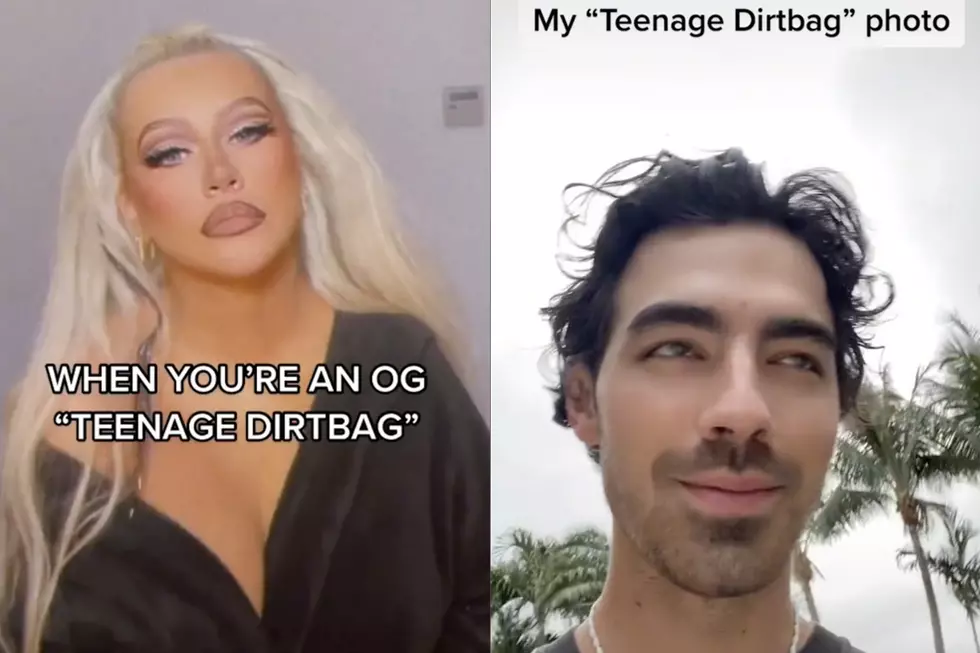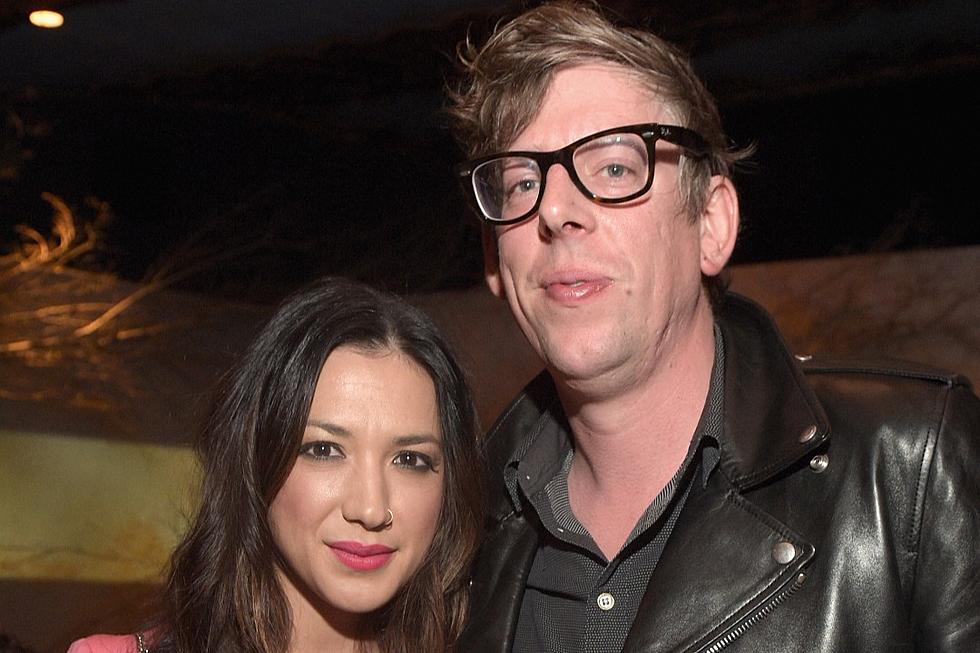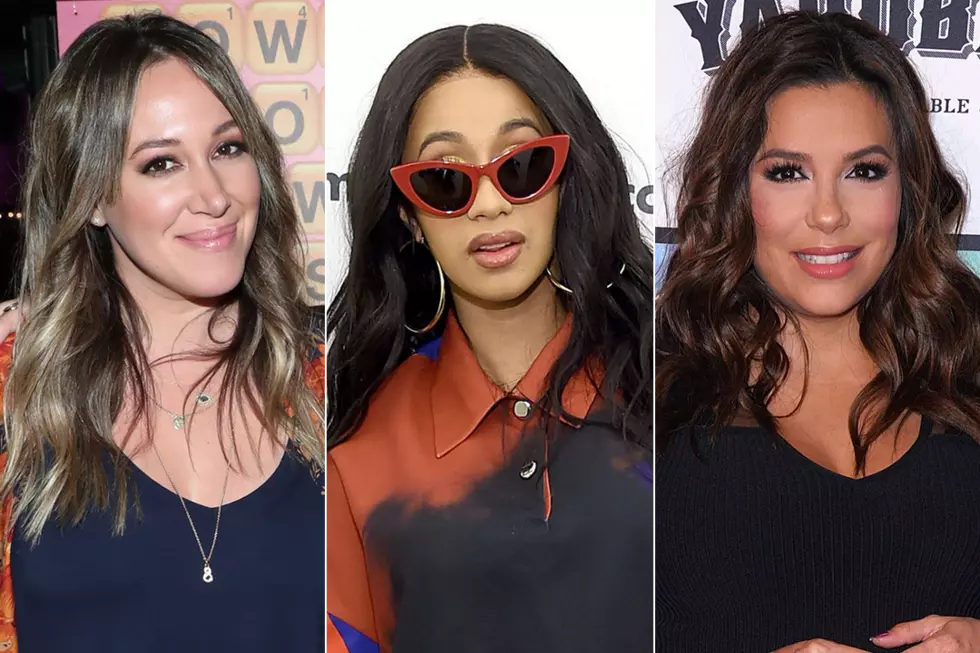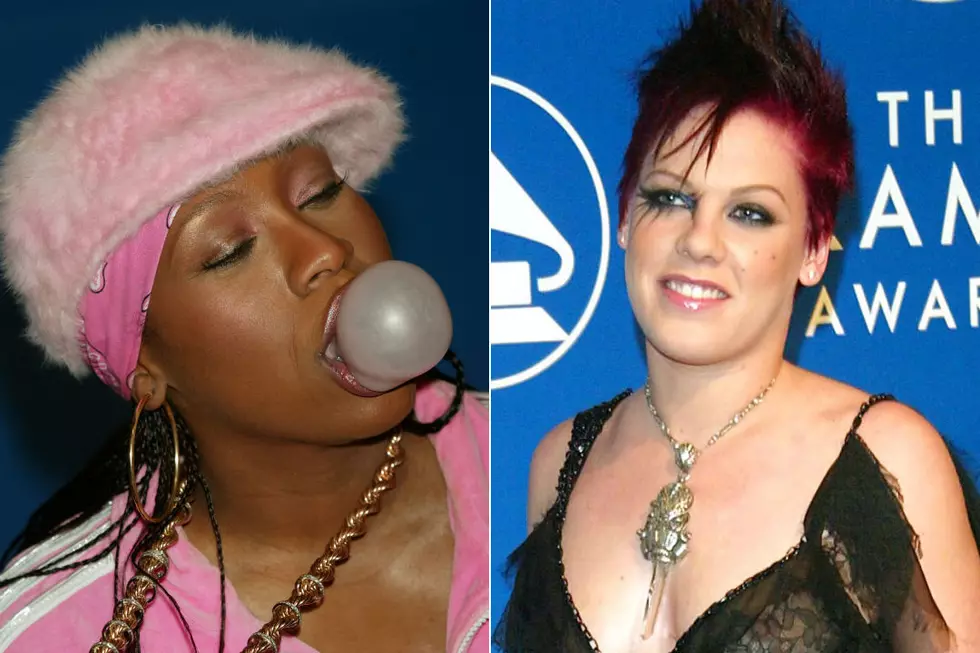
Hopelessly Devoted: Michelle Branch on Finding Album Inspiration Amid the Pain of Divorce
It's early March and as I first meet with Michelle Branch in the dimly-lit lounge of a swanky lower Manhattan hotel, I can't help but be immediately struck with how earnest and—so sorry to be cliché here—overwhelmingly down to earth she is.
My one-time teen idol (as an angsty thirteen-year-old I played The Spirit Room on my portable CD player over and over, until the batteries died) turned reformed indie rocker greets me with a big hug, and soon we find ourselves curled up on a rustic red velvet couch in the corner, excitedly pouring over Netflix shows (she recommends The Crown), movies (like me, she's obsessed with Get Out) and ancestry (she recently found out she's got some Irish in her family tree!) as we sip a crisp chenin blanc.
Soon, however, our talk turns to more serious matters: Music. Motherhood. Divorce. And the all the complex ways they intersect.
You see, it's been well over a decade since Branch was a mainstay on the pop charts (she was... "Everywhere"), and nearly fourteen long years since the release of her last solo studio album, 2003's Hotel Paper. Between then and now a lot has happened to the singer-songwriter, from a stint performing bluesy country tunes with her band The Wreckers, to raising a daughter of her own, to the tumultuous split from her husband of over ten years in 2015. ("Goodbye to You," indeed.)
Despite the pain, the anger, the despair and the confusion that comes built-in with divorce, Branch—a resilient creature who, thanks to the frustrations of record label limbo, knows a thing or two about picking up the pieces and starting over again—bounced back with an arsenal of emotional inspiration for new songs and, ultimately, a new album in her pocket.
As we chat about Hopeless Romantic, the musician's hazy, moody and occasionally glistening dream-rock album, I learn that with the numbing dread of unhappy endings, the optimistic hope of new beginnings is never far off behind: In 2015, Branch met The Black Keys' Patrick Carney, her now-musical collaborator... and boyfriend.
So, after all of the ups and downs: Is she happy now?
Find out for yourself below, as Branch discusses balancing her teenage years with the music industry, how record labels can wear an artist down, finding love after having her heart broken, bucking pop star expectations and finally making the indie rock album of her dreams.
How did you decide that now was the right time to dive back into solo album mode?
It wasn't really a decision. I had been actively trying to release music since The Wreckers. I had two shelved albums, back to back. It started to be very frustrating because I was the boy who cried wolf, I kept saying, "Oh, there's music coming out!” Because I literally would have it. Like the album cover was shot, the artwork was done, thanks yous were written… I had a release date that I didn’t announce, but I knew it. And I was doing radio promo, starting press. The most recent incidence was a pop album I worked on. The label president gets fired and suddenly they're like, "Wait a minute, we're going to restructure the company so your album's not coming out." And then the new company people would come in and say, "Oh, this music is old now, maybe you should go in and start re-writing."
That's frustrating.
That just kept happening. And the first album that got shelved was a country album after The Wreckers broke up because I had all this Wreckers material. And it was a similar thing, really. The Nashville office was like, "It's not country enough." And the LA office was like, "It's too country." And I just couldn't release music and all this time I had people who were like, "Please, we want this music!” And so I think it was really frustrating because every day I'd casually log into Facebook or Twitter or Instagram and I’d have angry messages from people like, "You lied to us, you said there was going to be music. All you do is Instagram food pictures." [Laughs] And I would be like, "Oh no."
At any point during that did you just get super disheartened or burnt out?
Oh, yeah. I mean, around the time I turned 30, I suddenly realized like, okay, I'm in a marriage that I shouldn't be in, I'm going to need to obviously make some grown up, big girl decisions about this. And suddenly I get divorced and a couple of months later I finally get off my record label that I had been on since I was 16... That's half my life right there! And I was just like, "Should I even be doing music?" Like, "What do I do?" And I went around and I met with major labels and everyone wanted me to be something I wasn't. Everyone saw this potential for me to be a Katy Perry or a Taylor Swift and I was just like, "I'm not going to dance."
You have to be authentic to your own identity.
And it’s not because I don't want to, but because I'm sparing you from seeing that. [Laughs] No but I was in a meeting with one record label where they were like, "I know what you need to do, you should collaborate with an EDM artist like Zedd!" And I was like, "Do you know me at all? Are we having this conversation? Are you really listening to yourself?" I started to get really frustrated and think like, "Okay, well maybe I had my moment in the sun and I have to move on." It was very easy to think that at certain times. Because after this keeps happening and happening, you start to go, "Okay, what's the common denominator? Oh, it's me. So maybe it's my fault.”
It's funny that you mention the EDM stuff, because I was wondering if A&R or anyone had tried to push you that way. But I think the direction you took feels really organic: It's super chill, laid back, honest. And the melodies are still there. How did you find your footing with the sound?
If I played you demos that I had when I started writing this record, it's literally laying down the foundations for what this record came to be. And I took these demos and I took them to different record labels. And people were just like, "You're not going to get on the radio with that, that's not what we're looking for." But it's what I wanted to do. It wasn't a thought-out, contrived thing. It's just that was the music I was making, it's the music I like. So, I knew I wanted to work with someone. I've always historically found success when I've had a partner to work with. When I made my first few records, John Shanks was really that person for me. He co wrote and played guitar and he was my partner on those records. And in The Wreckers, I had Jessica. So I wanted to find someone to collaborate with on the record. And I knew I had a very short dream list and Patrick [Carney] was on it.
And somehow it worked out!
Yeah, so what happened was I went to a Grammy party in February 2015 and I didn't really know anyone. Patrick had just broken his shoulder so he was not touring, he wasn't able to play drums. And he was sitting in the corner like, in a chair with his sling. And he was like, "Michelle?" And he called me over and he was like, "Why don't you have an album out?" And I was like, "Well, how much time do you have?" And I think Patrick, he loves underdogs, he loves an underdog story. And he was basically like, "I'm going to help you fix this. I'm going to help you figure this out."
I know that for this album you wanted it to be with a live band and have that raw instrumentation. When you listen to the record, you feel like it's in the room with you. Which I think is the beauty of instrumentation. So how was that process different from your first two albums?
You know, the process—believe it or not—really wasn't that different. I feel that the way that the Spirit Room and Hotel Paper were made were like the last glory days of record making. We were able to rent rooms at big studios in L.A. A&M Studios is where I primarily recorded and record labels don't really give budgets for that anymore. All those places are closing because everyone has a home studio, everyone's doing stuff on their computer.
And out on the road.
Right. And so in those days we hired session musicians and everything was live, as processed as it might sound, as far as everything was really compressed… So those were the days when you would not only get a recording budget, but there would be a catering budget too. It wasn't eating from Postmates. It was like, you're having three meals a day in the studio and they're paying for it all. It was old school. [Laughs] The interesting thing was, when I wanted Pat to produce this record, being an artist himself and knowing that artists need to recoup their recording costs, he was like, "I'm going to keep this budget really low so you can start making this money back and pay off this label debt."
That’s so thoughtful.
He went in and gave his initial budget to the label and my A&R guy was like, "This isn't expensive enough." And I was like, "What!?” And he said, "This sounds like he's like an up and coming producer, he should charge more." And I was like, "Do you realize what you're saying?" It's such a backwards, old way of thinking. Some of those producers made so much money per track on certain things.
More than the artist.
Exactly. And Patrick comes from this DIY background… But the thing that did change on this album is I feel like it has an independent spirit where we shut everyone out and it was really just Patrick and I.
There are so many themes about love and heartache on this album. It's so personal and intimate. How was it working with someone that you’re in a relationship with? You know, when you’re writing these lyrics—what's that dynamic like?
Luckily, a lot of the songs were pretty much finished before we started recording. [Laughs] Only a few were written after the fact because recently he's like, “I don’t want to know who these songs are about. I can't listen to the lyrics!” I started writing this record when my divorce started and then suddenly I was a single mom in her thirties living in Los Angeles going, “Oh shit! I have to date? What am I doing? This is a nightmare, what have I done? What have I gotten myself into?” Trying to navigate that and then finding love unexpectedly toward the end, there's a few songs that I did write that are definitely about Patrick. The album definitely is like the arch of losing love and then finding it again.
It reminds me so much of Gwen Stefani and early No Doubt when she was writing about Tony Kanal. How’d that dynamic play out?
I think there's just a level of safety and trust when you’re in an intimate relationship with someone, because being creative with someone is so intimate in and of itself. [Engineer and producer] John Shanks, who I did my first records with, he and I are homies for life. He's like my brother, I see him and it's like family. We had to have that trust there, because writing songs and sitting down and pouring your heart out and talking about stuff that's so personal, you have to have some sort of trust established. Patrick and I always tell each other, “I got your back above anything.” It creates this [space where] you’re not afraid to try and you’re not afraid to put an idea out there, even if you think it sucks.
I read some reviews where critics or whatever were saying you have “indie cred” now from working with Patrick, and because the sound is more lo-fi. But as a fan I thought that undermines your artistry and musicianship. I’ve always felt your music was cool and authentic. What are your thoughts on that sort of comment? Do you feel that way as well?
That's a really good question. I think if there was a free association with my name, people would be like, “Oh, that girl who was on MTV who sang that song…” I know it because I lived it and I heard it from people before. I know it was pop because it was popular. It was everywhere, no pun intended. [Laughs] I've always found success when I was doing something that wasn't the norm.
When my first record came out, I was playing guitar and writing my own music when no one else my age was. It was NSYNC and Backstreet Boys at the time, and then I went and made a country record when everyone was like, “It can't be done! Pop singers don't make country records, they won't let you win. It's a boys club, what are you doing?” There were literal interventions. People were trying to get me to stop doing the record! I financed that record myself, made that record myself, and was prepared to self release it if the label wasn't supporting it. So both of those experiences were not straight down the road. That said, this doesn't feel different to me. I know the cool kids probably never really loved those first records. [Laughs] But I made this record for the fans who have stood by me since that first album and have been very, very, very patiently waiting for this music.
It sounds like a natural progression. You've grown up. You’ve had so many changes in your life. I still can hear the thread of who you were then, but it's evolved and matured. It still sounds like diary entries to me.
I think the common thread is the reason why you can still tell it's me. I've always been the writer. It’s always been my literary voice, my story. If you think about it, Spirit Room and Hotel Paper were really, really hopeless romantic. [Laughs] Those were my teenage ideas of what love was and this is the grown up messy version of that.
Super messy. And beautiful. Both! Spirit Room and Hotel Paper, as I'm sure you've heard over and over again the past decade, meant a lot to a lot of people, myself included.
Someone told me today that they bought a guitar because of me. But then they never learned how to play it, so I was like, go get that guitar!
As a matter of fact, I did go buy a guitar because of girls like you and Avril Lavigne but I did not learn how to play it because I sucked at it. [Laughs] But I tried!
Originally, I played a blue Taylor guitar in that first video and Taylor Guitars contacted me and were like, “Thanks! We’re selling out of the blue guitars!”
Tell me you made some money from that...
No, I didn't even get an endorsement or anything. I couldn't even get them to send me an extra guitar. [Laughs] But they sold out! Taylor Swift had a blue Taylor guitar because of me. She told me!
Michelle Branch's impact!
My friend Devin did monitors for Taylor [Swift]. Early country Taylor. He'd be at every soundcheck and tell me, “Taylor plays three of your songs after soundcheck!” I'm like, really? She's played my song "All You Wanted" live during tours and stuff. I love hearing that. It's the most flattering thing because I was that girl in my room buying a guitar after I saw Alanis Morissette.
Speaking of, what were those albums that did for you what you did for my generation when you were a teen?
One of my first, earliest musical memories was I was literally in the back of my mom’s car and "Dreams" by Fleetwood Mac came on. I was living in Arizona and Stevie [Nicks] was the hometown hero. She's from Arizona, so she was a huge hero for me growing up. Huge influence. Then I remember being 11 or 12 years old when Jagged Little Pill came out. I was at a sleepover, and we were supposed to be asleep and we had MTV on. The “Hand in My Pocket” video came on and we all stopped what we were doing and were like, what is this? I remember both moments vividly because they were moments that were important to me. Shortly after that we snuck out of the house and we all got caught because we were staying at my friend’s house and her dad was our sixth grade teacher and he knew that we were awake, listening to Alanis Morissette. I'll have that memory for the rest of my life.
I love those stories. Some songs create these visceral memory imprints, don’t you think? A certain song comes on and it hits you like a brick.
It's like when you smell a smell that reminds you of something from your past. Music has that power. I remember my mom wouldn't let me buy Jagged Little Pill because there were curse words in it. So I had to save babysitting money and there wasn't even a record store in the town where I grew up so we had to drive two hours to go to Phoenix to go to a record store. The first thing I did when my mom wasn't looking was run into the store and grab Jagged Little Pill and hide it and listen to it in my room. I can still recite every lyric.
So funny. I literally did that with Evanescence’s album. I hid it in my bra drawer and my mom found it and she threw it out. She's like, “This looks satanic!” [Laughs] Now, those first two albums, are there songs on any of them that still resonate with where you are in your life, or are they more like time capsules?
It's been awhile since I've listened to any deep cuts. But certain songs have evolved over time. Sometimes I'll look back on a song or play it and be like, oh yeah, I guess that's what I was going through or that's what I meant. "Are You Happy Now" is still really relevant to me. When I sing that live, I'm still really into it. [Laughs]
I feel like it resonates so deeply with listeners because you truly feel those emotions in your gut. They're not the prettiest, but they're so human, so relatable.
I think the thing that's really interesting is my fans, when I released my record, were mostly my age. So I was singing about how I felt at that time and I think that the reason why it resonated is because everyone feels that way at that age. This record is about how me and my friends who are in their early thirties are like, “Are we supposed to have our shit together?” Because we don't. And you’re waiting for this moment to be a grown up, an official grown up. We're paying bills, trying to figure it out. Guess what? I still feel the same way I did when I was 18 going into my twenties. When I sent Hopeless Romantic to my sister and a few close friends to hear, they were like, “This feels like when I used to listen to your early stuff.” Because that's how I feel, and I think there's a lot of us who feel this way. We might be older, but we're still trying to figure it out.
Purchase Hopeless Romantic on Amazon or iTunes and stream on Spotify and Apple Music on April 7.
Then and Now: Music Stars of the 2000s
More From PopCrush









